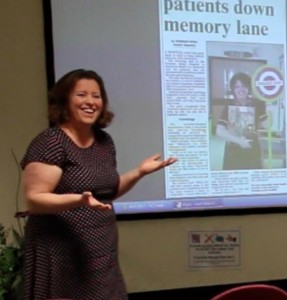Lucy Frost @lucyjmarsters from Brighton and Sussex University Hospitals NHS Trust(BSUH) @BSUH_NHS will be leading this week’s EBN Twitter Chat (#ebnjc) on Wednesday 1st July between 8-9pm UK time focusing on music therapy in dementia care.
Participating in the Twitter Chat requires a Twitter account; if you do not already have one you can create an account at www.twitter.com. Once you have an account contributing is straightforward:
- Go to your Twitter account
- Follow the discussion by searching for #ebnjc once linked to the discussion, click “all tweets” to keep up-to-date with recent tweets
- Add the EBN chat hash tag (#ebnjc) to your tweets to join in, this allows everyone taking part to view your contribution
BIO
Lucy Frost is a Dementia Nurse Specialist and Dementia Champion at Brighton and Sussex University Hospitals NHS Trust(BSUH). The Dementia Team at BSUH supports people with dementia and their loved ones and carers within the acute hospital setting – Lucy has been heavily involved with the development of this specialist support. She leads a programme of education around dementia for hospital staff and other health and care professionals. Lucy is a strong advocate for the need for Dementia Specialist Nurses and their impact across health and social care.
Twitter Handle: @lucyjmarsters
THE POWER OF MUSIC
The benefits of music for people living with dementia are obvious aren’t they? Music brings us back to memories buried deep within ourselves, it re connects us with feelings and emotions, it makes us laugh, cry and feel every emotion in between. In science, we know that music is a powerful stimulus for the brain. It is this stimulus that creates a response even when dementia has taken a person’s senses so far away from our reach.
So why is it that many of our hospitals and care homes play music that is obsolete to the people hearing it? A radio playing lamely in a corner, A collection of discs in a lounge that have not been chosen by the resident or their loved ones. Why can’t music and singing be heard often in hospital wards? Why can’t we help a person with dementia make a personal playlist?
I recently spent time with a person with dementia on one of our wards – They had few words, and their distress was obvious. A nurse told me of the person’s previous career as a dance teacher – A quick google search and clips later-On seeing Gene Kelly – We were singing and dancing in minutes. The words came back: We had a wonderful conversation about the dance halls of their era and their favourite dances.
Last year – I became aware of a film called Alive Inside, following a former social worker in his quest to procure music playing devices for American Nursing Home residents. This film shows powerfully the enormous impact of music when it reaches someone deemed ‘Unreachable’. The film shows everything that can be wrong with nursing home care, yet when the music comes, the human being within shines.
We decided to hold screenings of this film publicly, as well as using the film as part of an education programme for hospital staff – to show the power of music and get this message out into our local community. The response showed us how powerful music is – Nursing home leaders pledged to share more music, with one home buying I pods for their residents, hospital staff shared ideas as to how to make music a part of a day on a ward. The project was evaluated and it was clear that the message of the power of music has the potential to change the life of a person with dementia for the better.
Access to music therapy and the use of music in health care was a subject for debate at the recent Royal College of Nursing Congress in Bournemouth. The consensus was very much that music clearly is a massive enhancer for wellbeing – yet access to music and music based therapies remain limited.
I would like to know – What is out there for people living with dementia to help them connect with the music that matters to them. Why don’t people living with dementia have access to a personal playlist – There are people out there trying to widen the reach – Playlist for Life, Memory Bank, Life Story Network, Singing for the brain sessions hosted by the Alzheimer’s Society – Why aren’t these initiatives being adopted everywhere?
What are people’s experiences of using music to help a person with dementia? What work is going on to show the value of music and therefore promote the uptake of music based therapies? These are all things I would like to focus on in Wednesdays #ebnjc chat.
I am sure many people will have already seen this – but if you can – watch this: The importance of music in this moment needs no explanation.
SUGGESTED MEDIA
Music and Memory Organisation (USA)
Sally Magnussun writes about her experiences
